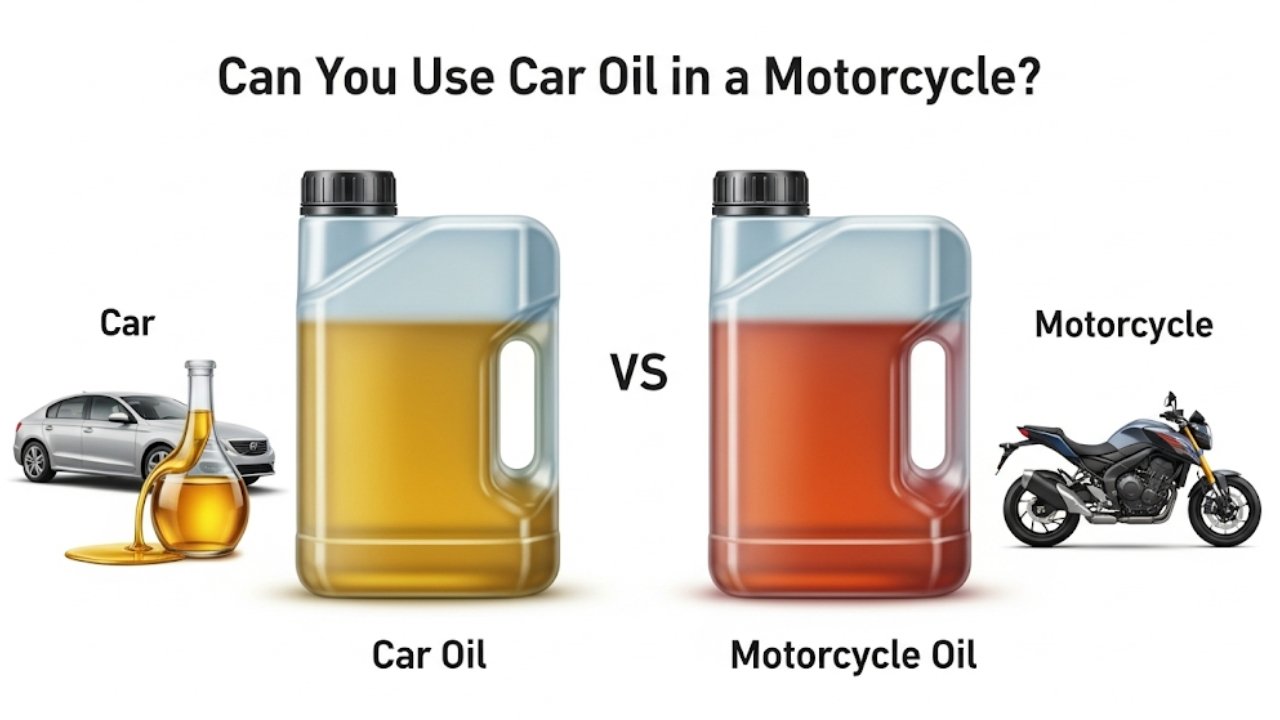Can You Use Car Oil in a Motorcycle?

You’re standing in your garage, eyes darting between your car’s engine oil and your motorcycle. It’s late, shops are closed, and you’re wondering: can you use car oil in a motorcycle? It feels like a harmless shortcut, right? After all, oil is oil… or is it?
This question isn’t just a one-time garage dilemma. Many motorcycle owners—especially new riders—have faced this very situation. But the answer is more complex than it seems. Yes, both oils lubricate engines, but their differences could mean the life or death of your motorcycle’s performance.
In this guide, we’re going to break it all down in plain English. We’ll talk about the science, the risks, the stories, and the simple facts. And yes, I’ll even share a personal story that made me learn this the hard way.
So grab a coffee (or a wrench), and let’s dive into whether or not you can use car oil in a motorcycle—and what really happens when you do.
What Makes Motorcycle Oil and Car Oil Different?

At first glance, car oil and motorcycle oil might look the same. Same golden liquid. Same shiny bottle. But here’s the thing—they’re not created equal. Each type is specially designed for the machine it serves.
Here’s why motorcycle oil is unique:
-
Motorcycles use shared lubrication for the engine, gearbox, and clutch.
-
Car engines don’t have wet clutches, which makes their oil formula different.
-
Shear strength in motorcycle oil is higher to handle transmission stress.
-
Additives in car oils may hurt the clutch in bikes.
Now, let’s look at a quick comparison in a table:
| Feature | Motorcycle Oil | Car Engine Oil |
|---|---|---|
| Used in Gearbox? | Yes | No |
| Wet Clutch Compatibility | Yes (JASO MA certified) | No (often contains friction modifiers) |
| Shear Resistance | High | Medium |
| Additive Formulation | Designed to prevent clutch slippage | Designed for fuel economy |
| Viscosity Stability | More stable under high RPM | Stable under normal RPMs |
So when you wonder “can you use car oil in a motorcycle?”, the technical answer is—it depends on the motorcycle and the oil type. But for most riders, especially those with bikes using a wet clutch system (which is common), it’s risky.
Personal Experience: When I Used Car Oil in My Bike (And Regretted It)
Let me tell you a quick story.
I once owned a 150cc commuter bike—reliable, fun, and cheap to maintain. One day, I ran out of motorcycle oil before a road trip and thought, “Why not just top it off with the car oil I have?” It was fully synthetic 5W-30 for my sedan. I poured it in, shrugged, and hit the road.
The first 20 km felt okay. But soon, the gear shifts got rough, the engine felt hotter, and—worst of all—the clutch started slipping under load. I had no idea what was wrong until a mechanic friend asked, “Did you use car oil in this?”
The repair cost me more than the entire oil change would have. Lesson learned.
Why Using Car Oil in a Motorcycle Can Damage the Clutch
One of the biggest concerns with using car engine oil in a motorcycle is the wet clutch. In motorcycles, the clutch sits in the same oil as the engine and transmission. That means it needs oil that won’t cause it to slip.
Most car oils have friction modifiers to improve fuel economy. These can be great for cars but terrible for your bike’s clutch.
When you use car oil:
-
Your clutch plates may slip.
-
You’ll lose power under acceleration.
-
Gear shifting becomes clunky and unpredictable.
-
Long-term damage can shorten engine life.
If you ever feel your motorcycle struggling to accelerate or hear a whining sound while revving, and you’ve recently used car oil—well, now you know why.
JASO vs. API: Understanding Oil Ratings Matters
When choosing oil, you might have noticed terms like JASO MA or API SN on the label. These aren’t random codes—they tell you whether the oil meets certain performance standards.
What do they mean?
-
JASO MA / MA2: Certified for motorcycles with wet clutches. No friction modifiers.
-
API SN / SM / SL: These are automotive oil standards focused on engine protection and emissions.
If the oil says API SN + JASO MA, it’s safe for motorcycles. If it only says API SN and not JASO, it might contain additives that can cause clutch slippage.
So before using any oil, look at the label. If it’s not JASO MA certified, don’t put it in your bike.
When Is It Ever Safe to Use Car Oil in a Motorcycle?
Let’s be honest—there are a few rare cases where you can use car oil in a motorcycle without serious issues. But they’re exceptions, not the rule.
You might get away with it if:
-
Your motorcycle has a dry clutch (uncommon, but some BMW and Ducati bikes do).
-
The car oil is non-energy conserving and meets JASO MA standards.
-
You’re doing a temporary top-up in an emergency and plan to replace it soon.
Even then, use caution. It’s like putting tap water in a fish tank—it might not kill the fish immediately, but it’s not ideal.
What Can Happen to the Engine If You Use the Wrong Oil?
Besides the clutch issues, your engine might suffer too. Car oils are designed for smoother, lower-RPM engines. Motorcycles often run hotter and rev higher, especially sports bikes.
Here’s what the wrong oil can do:
-
Break down under heat faster than motorcycle oil.
-
Leave deposits that damage valves and pistons.
-
Thin out and fail to lubricate under extreme RPMs.
Your bike’s engine is like a heart—using the wrong oil is like giving it the wrong blood type. It might run for a while, but sooner or later, something’s going to break.
Key Takeaways: Car Oil in a Motorcycle – Yes or No?
Let’s sum it up simply.
Can you use car oil in a motorcycle?
Technically, yes—but you probably shouldn’t.
Unless the oil is specifically rated for motorcycle use (JASO MA), and unless your motorcycle has a dry clutch, it’s too risky to use car oil. You might save a few bucks today, but you could pay much more tomorrow.
Here’s a quick cheat sheet:
-
✅ Use motorcycle oil with JASO MA/MA2 label.
-
⚠️ Avoid car oil with friction modifiers (usually labeled “energy conserving”).
-
❌ Don’t use car oil in wet clutch motorcycles.
Common Signs You’ve Used the Wrong Oil
Let’s say you already made the mistake. How do you know if your bike is suffering from the wrong oil?
Watch for:
-
Clutch slippage (bike revs high, speed doesn’t increase).
-
Overheating engine.
-
Rough or jerky gear shifts.
-
Smoke from the exhaust.
-
Burnt oil smell.
If any of these symptoms show up after an oil change, drain it out and refill with proper motorcycle engine oil ASAP.
How to Choose the Right Oil for Your Motorcycle
Choosing the right oil can feel overwhelming, especially when you’re staring at rows of bottles with numbers, letters, and fancy terms. But don’t worry—I’ll make it super simple.
Here’s what to look for:
-
Check your manual first. Every motorcycle has specific oil recommendations. Follow them.
-
Look for JASO MA or MA2. This means it’s safe for wet clutches.
-
Check viscosity grade. Common grades are 10W-40 or 20W-50 for motorcycles.
-
Go for trusted brands. Stick to brands like Motul, Castrol, Shell, or Mobil that clearly label their motorcycle oils.
When you ask “can you use car oil in a motorcycle?”, remember—it’s not just about whether it fits the engine. It’s about long-term performance, safety, and peace of mind.
Mixing Car Oil and Motorcycle Oil: Is That a Thing?
Sometimes people wonder if they can mix a bit of car oil with motorcycle oil. Maybe you’re running low during an oil change. Is that okay?
Short answer: Not recommended.
Even if both oils are the same viscosity grade (like 10W-40), the difference in additives and friction modifiers can:
-
Compromise clutch function.
-
Cause inconsistent lubrication.
-
Dilute the benefits of motorcycle-specific oil.
If you’re in a tight spot, it’s better to top up with a compatible motorcycle oil or wait until you get the right one. It’s just not worth the risk.
Cultural Insights: Why Some Riders Still Use Car Oil in Motorcycles
In many parts of the world—especially South Asia, Africa, and Latin America—riders often use car oil in motorcycles. Why?
-
Availability: Motorcycle oil might be harder to find in rural areas.
-
Cost: Car oil is sometimes cheaper or sold in bulk.
-
Misinformation: Many believe all engine oils are the same.
But even in these regions, mechanics and riders are starting to catch on. Online communities and YouTube tutorials have helped raise awareness about the importance of proper lubrication.
In fact, many local mechanics I’ve spoken with in Bangladesh and India now insist on using JASO MA oils, especially after seeing frequent clutch failures caused by car oil.
So, culture plays a role, but education is changing habits for the better.
The Science of Shear: Why Motorcycle Oil Is Tougher
Let’s get a little geeky for a moment—but stick with me.
Your motorcycle’s transmission has gear teeth that mash and grind together rapidly. This places a lot of mechanical stress, or shear, on the oil. If the oil isn’t strong enough, it breaks down.
Motorcycle oil is formulated with higher shear stability. It keeps its protective layer intact even under high RPMs. Car oil? Not built for that. It shears faster, meaning your engine and transmission parts start grinding each other down. Slowly, silently, and expensively.
This is why asking “can you use car oil in a motorcycle” isn’t just about whether it fits—it’s about whether it survives.
Environmental Perspective: Is Reusing Car Oil in Bikes Eco-Friendly?
You might think that using one type of oil for both car and bike is more eco-friendly, maybe even cost-effective. After all, less waste, fewer bottles, right?
But here’s the truth:
-
If car oil damages your clutch or engine, you’ll end up using more resources in the long run (repairs, new parts, disposal of damaged oil).
-
Motorcycle engines need different additives that break down differently and produce different emissions.
-
Using the correct oil helps your bike run efficiently, reducing pollution and increasing fuel economy.
So if you’re eco-conscious, choose the right oil. It’s better for your bike and the planet.
What Mechanics Say: Real-World Advice from the Experts
I’ve asked more than a dozen local mechanics this question: Can you use car oil in a motorcycle?
Here’s a summary of what they said:
“We see so many customers who thought they were saving money but ended up replacing clutches.”
“Some oils say synthetic, but that doesn’t mean safe for bikes.”
“Always check for JASO MA2. If it’s not there, don’t risk it.”
Across the board, the consensus is clear: even if it works temporarily, using car engine oil in a motorcycle can cost more in the long run. Mechanics see the results first-hand, and they’re not pretty.
Budget Tips: How to Save Money on Motorcycle Oil the Right Way
I get it—motorcycle oil can seem pricey. But there are smarter ways to save than using the wrong oil.
Try these tips:
-
Buy in bulk. Some shops sell motorcycle oil in gallon containers.
-
Wait for sales. Online deals can save you 20-30%.
-
Use semi-synthetic oil. It’s cheaper than full synthetic and still protects well.
-
Change oil on time. Skipping changes doesn’t save money—it costs more in wear.
If you ride regularly, keeping a stock of proper oil in your garage is the best investment you can make for your motorcycle’s health.
Summary: The Final Word on Car Oil in Motorcycles
Let’s wrap it all up with a final verdict.
❌ Car oil and motorcycle oil are not the same.
❌ Using car oil in a wet clutch motorcycle is risky.
✅ Motorcycle oil is specially made for your engine, clutch, and gears.
✅ Look for JASO MA/MA2 certification on the bottle.
So when someone asks, “Can you use car oil in a motorcycle?”, you now have the answer:
You can, but you shouldn’t—unless the oil is JASO MA approved and your bike’s clutch and engine are compatible. Even then, it’s a compromise.
Think of it like feeding your dog cat food. It might keep them alive for a while, but it’s not meant for them. Over time, it will cause more harm than good.
FAQs: Straightforward Answers to What Riders Ask
1. Can you use car oil in a 4-stroke motorcycle?
Answer: Only if the oil is JASO MA certified and doesn’t have friction modifiers. Otherwise, avoid it.
2. Is there a difference between synthetic car oil and synthetic motorcycle oil?
Answer: Yes. Even synthetic car oils may lack the additives required for high-revving engines and wet clutch compatibility.
3. Can using car oil void my motorcycle warranty?
Answer: Absolutely. Manufacturers can deny warranty claims if improper oil was used.
4. Can I use car oil just once in an emergency?
Answer: If necessary, and if it’s non-energy-conserving. But change it out quickly.
5. What if I already used car oil in my bike—what should I do?
Answer: Change it ASAP and replace with motorcycle-specific oil. Monitor your clutch and engine for any odd behavior.
6. How often should I change motorcycle oil?
Answer: Every 2,000 to 5,000 km depending on the oil type and your riding habits.
7. What happens if I accidentally use the wrong oil once?
Answer: It may not kill your bike instantly, but flush and replace it soon to avoid long-term damage.
8. Is synthetic motorcycle oil better than mineral oil?
Answer: Yes, synthetic oil lasts longer and handles heat better, especially for high-performance bikes.






